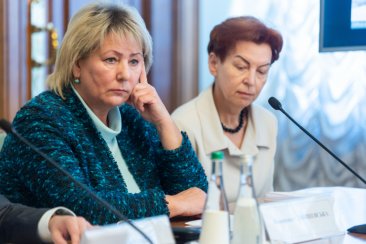Contact center of the Ukrainian Judiciary 044 207-35-46
ABOUT THE SUPREME COURT
FOR CITIZENS
ACTIVITY
PRESS-CENTER

SC President Valentyna Danishevska took part in a working meeting on the state of implementation of judicial reform which took place in the Office of the President on September 30, 2021.
In her speech, the President of the Supreme Court stressed that "there can never be such a rule in the law that would allow one branch of government to destroy another branch of government." She called on all the participants of the meeting to make every effort so that "this reform turns into a success, not a debriefing."
Here is the full text of her speech:
“I am here to emphasize once again that we had been relentlessly working to make this reform a success even before the laws were passed. And this is confirmed by the fact that the reform began owing to the actions of the High Council of Justice, owing to the conscience of those people who work there.
The key to success of the reform is not the adoption of laws, but for the judiciary to have its worthy representatives and representatives of other legal professions in the judicial governing bodies. The judiciary wants the changes in its ranks and in the governing bodies to take place. But in the process of these sincere aspirations, which we and you have, I hope that the judiciary, as a separate branch of government, should not lose its subjectivity.
The state cannot exist if there is no judiciary, even for a month, day or hour. The judiciary does not exist when there is the District Court of Kamianets-Podilskyi City or Odessa District Court. The judiciary exists when there is the main body of the judiciary.
There is no legislature if there is no Parliament. There is no executive power when there is no Cabinet of Ministers. So, the Constitution of Ukraine, as well as constitutions of many other states, provides that in order for democracy, along with the system of checks and balances within it, to exist and function, there must always be, every day and every minute, the Verkhovna Rada of Ukraine, the Cabinet of Ministers of Ukraine, the President and the High Council of Justice.

Last time, I drew your attention to the fact that we should all make sure that the negative consequences of this interference [in the judiciary] did not exceed the positive results.
I will not repeat, although, obviously, not everyone was present at that meeting. But I think it's clear for everyone - the negative aspects cannot outweigh the positive ones.
I think it is clear for everyone present that the reform can only be successful if all or at least most of the participants present in the Parliament, at the Bar Congress and at the Congress of Judges vote for the candidates nominated by the Ethics Council.
Both before the adoption of the laws and now I do not get tired of calling on everyone to ensure that we do not quarrel with each other, because this will simply destroy all the best wishes that we and those who are involved in this reform have.
Only together can we achieve this success. Otherwise, we will just show people how one body blames another body, and then who will be to blame?
At this point, two important questions remain: we must all believe in the real purpose of this reform. Is the HCJ law a law on how to disperse the HCJ, how to destroy the HCJ? Or is it perhaps a law on how to help the judiciary move forward? Get opportunities for development? And thus to provide better justice for the people.
The internal contradictions of the law and its low quality do not allow us to find the answer to this question in the law. But the further actions of the Verkhovna Rada, in particular the intimidation of judges, and the rhetoric that accompanies a rather delicate case, testify to the former. That the purpose of this Law is the destruction of the key body of the judiciary.
Why do you turn judges against the reform, if judges, in principle, should be interested in it themselves? It is up to the judges under this Law to make the final chord in this reform. That is why we need to reach an understanding.

Mr. Buquicchio, in addition to the official statement, also sent a letter to me personally. I am quoting it precisely because we have already touched on his statement. He said, "Indeed, as you rightly pointed out, the Ethics Council should carry out and organize its work so as not to cause any disruption in the work of the High Council of Justice".
Therefore, with full understanding, we could rely on the experience, intelligence and wisdom of those foreign experts who will come to us to help select HCJ members. But there can never be such a rule in the law that would allow one branch of government to destroy another branch of government."
We therefore call on our partners, if this reform is to be successful, to make small changes to the law in order to change the attitude of the judges to this reform and to achieve the desired result. And I am not here to call for us to stop and wait. As I said, the last chord is still far ahead. We need to change attitudes towards each other and do whatever it takes to make this reform a success, not a debriefing.
I really hope that is exactly what we will all do".